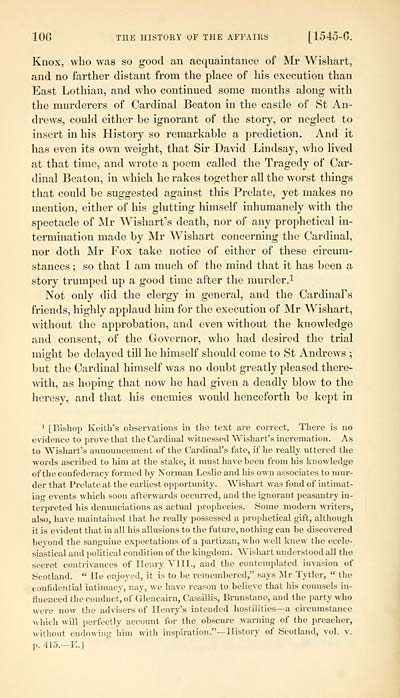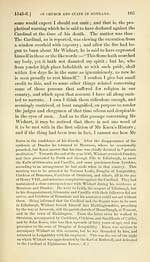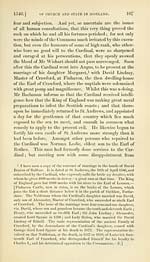Spottiswoode Society > History of the affairs of the Church and State of Scotland from the beginning of the reformation to the year 1568 > Volume 1
(242) Page 106
Download files
Complete book:
Individual page:
Thumbnail gallery: Grid view | List view

100 THE HISTORY OF THE AFFAIRS [1545-0.
Knox, who was so good an acquaintance of Mr Wishart,
and no farther distant from the place of his execution than
East Lothian, and who continued some months along with
the murderers of Cardinal Beaton in the castle of St An-
drews, could either be ignorant of the story, or neglect to
insert in his History so remarkable a prediction. And it
has even its own weight, that Sir David Lindsay, who lived
at that time, and wrote a poem called the Tragedy of Car-
dinal Beaton, in which he rakes together all the worst things
that could be suggested against this Prelate, yet makes no
mention, either of his glutting himself inhumanely with the
spectacle of Mr Wishart's death, nor of any prophetical in-
termination made by Mr Wishart concerning the Cardinal,
nor doth Mr Fox take notice of either of these circum-
stances ; so that I am much of the mind that it has been a
story trumped up a good time after the murder. 1
Not only did the clergy in general, and the Cardinal's
friends, highly applaud him for the execution of Mr Wishart,
without the approbation, and even without the knowledge
and consent, of the Governor, who had desired the trial
might be delayed till he himself should come to St Andrews ;
but the Cardinal himself was no doubt greatly pleased there-
with, as hoping that now he had given a deadly blow to the
heresy, and that his enemies would henceforth be kept in
1 [Bishop Keith's observations in the text are correct. There is no
evidence to prove that the Cardinal witnessed Wishart's incremation. As
to Wishart's announcement of the Cardinal's fate, if he really uttered the
words ascribed to him at the stake, it must have been from his knowledge
of the confederacy formed by Norman Leslie and his own associates to mur-
der that Prelate at the earliest opportunity. Wishart was fond of intimat-
ing events which soon afterwards occurred, and the ignorant peasantry in-
terpreted his denunciations as actual prophecies. Some modern writers,
also, have maintained that he really possessed a prophetical gift, although
it is evident that in all his allusions to the future, nothing can be discovered
beyond the sanguine expectations of a partizan, who well knew the eccle-
siastical and political condition of the kingdom. Wishart understood all the
secret contrivances of Henry VIII., and the contemplated invasion of
Scotland. " He enjoyed, it is to be remembered," says Mr Tytler, " the
confidential intimacy, nay, we have reason to believe that his counsels in-
fluenced the conduct, of Glencairn, Cassillis, Brunstane, and the party who
were now the advisers of Henry's intended hostilities— a circumstance
which will perfectly account for the obscure warning of the preacher,
without endowing him with inspiration."— History of Scotland, vol. v.
].. 415.— -E.]
Knox, who was so good an acquaintance of Mr Wishart,
and no farther distant from the place of his execution than
East Lothian, and who continued some months along with
the murderers of Cardinal Beaton in the castle of St An-
drews, could either be ignorant of the story, or neglect to
insert in his History so remarkable a prediction. And it
has even its own weight, that Sir David Lindsay, who lived
at that time, and wrote a poem called the Tragedy of Car-
dinal Beaton, in which he rakes together all the worst things
that could be suggested against this Prelate, yet makes no
mention, either of his glutting himself inhumanely with the
spectacle of Mr Wishart's death, nor of any prophetical in-
termination made by Mr Wishart concerning the Cardinal,
nor doth Mr Fox take notice of either of these circum-
stances ; so that I am much of the mind that it has been a
story trumped up a good time after the murder. 1
Not only did the clergy in general, and the Cardinal's
friends, highly applaud him for the execution of Mr Wishart,
without the approbation, and even without the knowledge
and consent, of the Governor, who had desired the trial
might be delayed till he himself should come to St Andrews ;
but the Cardinal himself was no doubt greatly pleased there-
with, as hoping that now he had given a deadly blow to the
heresy, and that his enemies would henceforth be kept in
1 [Bishop Keith's observations in the text are correct. There is no
evidence to prove that the Cardinal witnessed Wishart's incremation. As
to Wishart's announcement of the Cardinal's fate, if he really uttered the
words ascribed to him at the stake, it must have been from his knowledge
of the confederacy formed by Norman Leslie and his own associates to mur-
der that Prelate at the earliest opportunity. Wishart was fond of intimat-
ing events which soon afterwards occurred, and the ignorant peasantry in-
terpreted his denunciations as actual prophecies. Some modern writers,
also, have maintained that he really possessed a prophetical gift, although
it is evident that in all his allusions to the future, nothing can be discovered
beyond the sanguine expectations of a partizan, who well knew the eccle-
siastical and political condition of the kingdom. Wishart understood all the
secret contrivances of Henry VIII., and the contemplated invasion of
Scotland. " He enjoyed, it is to be remembered," says Mr Tytler, " the
confidential intimacy, nay, we have reason to believe that his counsels in-
fluenced the conduct, of Glencairn, Cassillis, Brunstane, and the party who
were now the advisers of Henry's intended hostilities— a circumstance
which will perfectly account for the obscure warning of the preacher,
without endowing him with inspiration."— History of Scotland, vol. v.
].. 415.— -E.]
Set display mode to: Large image | Transcription
Images and transcriptions on this page, including medium image downloads, may be used under the Creative Commons Attribution 4.0 International Licence unless otherwise stated. ![]()
| Permanent URL | https://digital.nls.uk/79599692 |
|---|
| Description | Volume I. |
|---|---|
| Attribution and copyright: |
|

